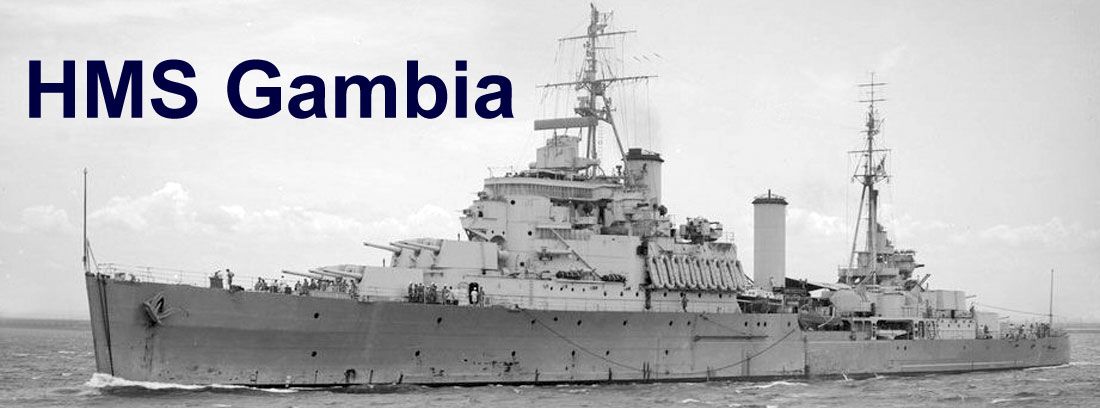
Herbert Christopher (Chris, Brummy) Beresford
The following was sent by Chris Beresford who was an Able Seaman Radar Operator on the 1946/48 commission.
The 1946-48 Commission was the first after Gambia was returned to The Royal Navy after serving in the war as a Unit of the Royal New Zealand Navy. When we took it over it still had about 30 Boy Seamen onboard, all New Zealanders and they came with us as part of our crew on the commission. The Captain was Baker Creswell, who had a distinguighed war career, and the Commander was Maitland-McGill-Crichton.
We sailed in October 1946 and made our way to The Far East via, Gibraltar, Malta, Suez Canal, Aden, Ceylon (now Sri Lanka), Singapore and Hong Kong.
We took our place in the 5th Cruiser Squadron, British Pacific Fleet and for a short time we were the flagship of 5th Cruiser Squadron carrying the Flag of Rear Admiral 'Scouse' Woodhouse.
For the next twelve months we spent our time in Japan with short breaks in Hong Kong. We also visited Shanghai and Chinwangtao in China. Altough the Chinese Civil war was taking place it had not yet reached the coast.
Whilst in Chinwangtao many of the Crew took the opportunity to visit The Great Wall of China. For some reason I did not go and have regretted it ever since.
We visited most of the larger ports in Japan and my most vivid memory is taking a short train journey to Hiroshima. Although it was 18 months after the Atom Bomb had dropped the place was still completely devastated and the people living in very poor conditions. One could not help but pity them.
Gambia was a happy ship and I think that most of the Crew would have been content to serve the three years out in the Far East that we expected. However, like a bombshell, came the unexpected news that the Government had decided that all "Hostilities Only" personnel were to be demobbed as soon as possible. Many of the regular ratings onboard were transferred to other ships and replaced by 'hostilites only' ratings. We then sailed for the U.K. manned almost entirely, by 'hostilities only' ratings. However, many of these ratings had much experience having served during the war. Most of the Officers and Senior Crew stayed with us.
The voyage home was enlivened when trouble broke out in Aden and we were instructed to proceed at full speed in order to help quell the trouble. When we arrived we found that the trouble had been contained and all that was necessary was to march around the town with bayonets fixed in order to give a show of strength.
Arriving at Devonport on 6th January 1948 those of us due for demob said 'Au Revoir' to our friends, and went into Guzz Barracks. After a spell of leave we returned to Portsmouth where all the formalities of demobilisation were completed. We then all went our separate ways with our new civvy suits in a cardboard box. I personally had enjoyed my time in the Andrew but was looking forward to renewing my civilian life.
Chris Beresford. November 2003.